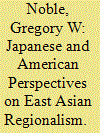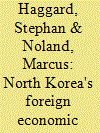| Srl | Item |
| 1 |
ID:
081499


|
|
|
|
|
| Publication |
2008.
|
| Summary/Abstract |
Regular convening of East Asian summits and rising concerns about the American dollar have heightened interest in Asian cooperation. Japan will necessarily play a central role in regional endeavors, and the United States must at least acquiesce if regional coordination is to progress. Among American accounts, the most theoretically elaborate and systematically comparative analysis is A World of Regions, while Remapping East Asia provides the most authoritative overview of recent developments. Japanese-language studies of East Asian regionalism agree that regional cooperation is far less institutionalized and rule-based in East Asia than in Europe, but they include a wider range of opinion about the desirability and feasibility of cooperation. Skeptics on the right warn that efforts to create a regional community would weaken the United States-Japan alliance, undermine universal values, and cede regional leadership to China. Optimists on the left counter that regional cooperation holds out the only hope for ameliorating nationalist conflicts. Most numerous are centrists arguing for active cooperation on economics and the environment, but only cautious moves on politics and security. Despite their caution, Japanese authors convey a sense that changes to the American-led global and regional order are occurring and likely will continue.
|
|
|
|
|
|
|
|
|
|
|
|
|
|
|
|
| 2 |
ID:
081496


|
|
|
|
|
| Publication |
2008.
|
| Summary/Abstract |
In September of 2005, Malaysia-Thailand relations were stressed by an incident in which 131 Thai Muslims fled across the Southern Thai border to seek refuge in Malaysia. The Malaysian government initially refused to return these 'asylum seekers,' and eventually chose to internationalize the situation by calling on the United Nations High Commission on Refugees (UNHCR). Malaysia's decision to internationalize the issue points to potential instability in Malaysia-Thailand bilateral relations and reflects several internal political problems faced by United Malays National Organization (UMNO) central decisions makers. This paper seeks to explain the Malaysian central government's security perspective on the northern border region. To do this, I employ Muthiah Alagappa's framework for security culture analysis in an attempt to understand Malaysian security culture from the perspective of that culture's central decision makers themselves
|
|
|
|
|
|
|
|
|
|
|
|
|
|
|
|
| 3 |
ID:
081498


|
|
|
|
|
| Publication |
2008.
|
| Summary/Abstract |
Many debates about engagement with North Korea hinge on the precise nature of North Korea's foreign economic relations: whether trade and investment are on commercial or non-commercial terms; the extent of illicit activities, and the changing geographic patterns of North Korea's trade. This article provides an effort to reconstruct North Korea's foreign economic relations, subordinating our estimates to the discipline of the balance of payments accounting framework. Among the most salient findings for the debate about engagement and sanctions is that North Korea's trade and investment have continued to increase despite the onset of the nuclear crisis and a decline in illicit activities. This growth has occurred in part because of the growing weight of China and South Korea in trade, aid, and investment. We also find that economic relations between North and South Korea have a substantially greater non-commercial component than those occurring across the China-North Korea border
|
|
|
|
|
|
|
|
|
|
|
|
|
|
|
|
| 4 |
ID:
081497


|
|
|
|
|
| Publication |
2008.
|
| Summary/Abstract |
The 1989 Comprehensive Plan of Action (CPA) has recently been described as a successful example of how to manage large protracted refugee flows. However, this article revisits the circumstances surrounding the CPA used to resolve the prolonged Indo-Chinese refugee crisis to highlight that part of its development was linked to the fact that Southeast Asian states refused to engage with proposed solutions, which did not include repatriation for the majority of the Indo-Chinese asylum seekers who were deemed to be 'non-genuine'1 (UNGA, 1989a) refugees. This resulted in the CPA often forcibly repatriating 'non-genuine' refugees, particularly near the end of its program. This article reviews the CPA in order to assess whether its practices and results should be repeated
|
|
|
|
|
|
|
|
|
|
|
|
|
|
|
|
| 5 |
ID:
081494


|
|
|
|
|
| Publication |
2008.
|
| Summary/Abstract |
This article analyzes the reasons that led to the six United States forces withdrawals from South Korea between 1947 and 2008 and the Republic of Korea's responses to these policies. The article discusses the local and global aspects of these forces' functions and tasks and attempts to understand why Korea has not prepared itself for the withdrawal of the US forces throughout the years. The article will argue that there might be a seventh withdrawal of US forces from Korea in the near future, which South Korea and the USA should begin preparing for
|
|
|
|
|
|
|
|
|
|
|
|
|
|
|
|
| 6 |
ID:
081495


|
|
|
|
|
| Publication |
2008.
|
| Summary/Abstract |
Linkage politics in the US were revived after the terrorist attacks in 2001 as the US endeavored to bolster its position in the international system. This paper examines current US economic statecraft in East Asia, particularly through the use of the preferential trade agreement instrument. As the US encounters increasing threats in the region through China's economic and military expansion, the emergence of Islamic militancy, and continuing tensions on the Korean peninsula, it is attempting to reinforce its strategic position through the economic reinforcement of its bilateral politico-military alliances. However, as the establishment of its recent free trade agreements has revealed, neo-mercantilist politics, as motivated by US Congressional attention to domestic lobbying, present a risk to this strategy. It is possible that this tendency to economic nationalism, as evidenced in the Australia-US Free Trade Agreement, will detract from the broader purpose of reinforcing the US strategic position in the region.
|
|
|
|
|
|
|
|
|
|
|
|
|
|
|
|